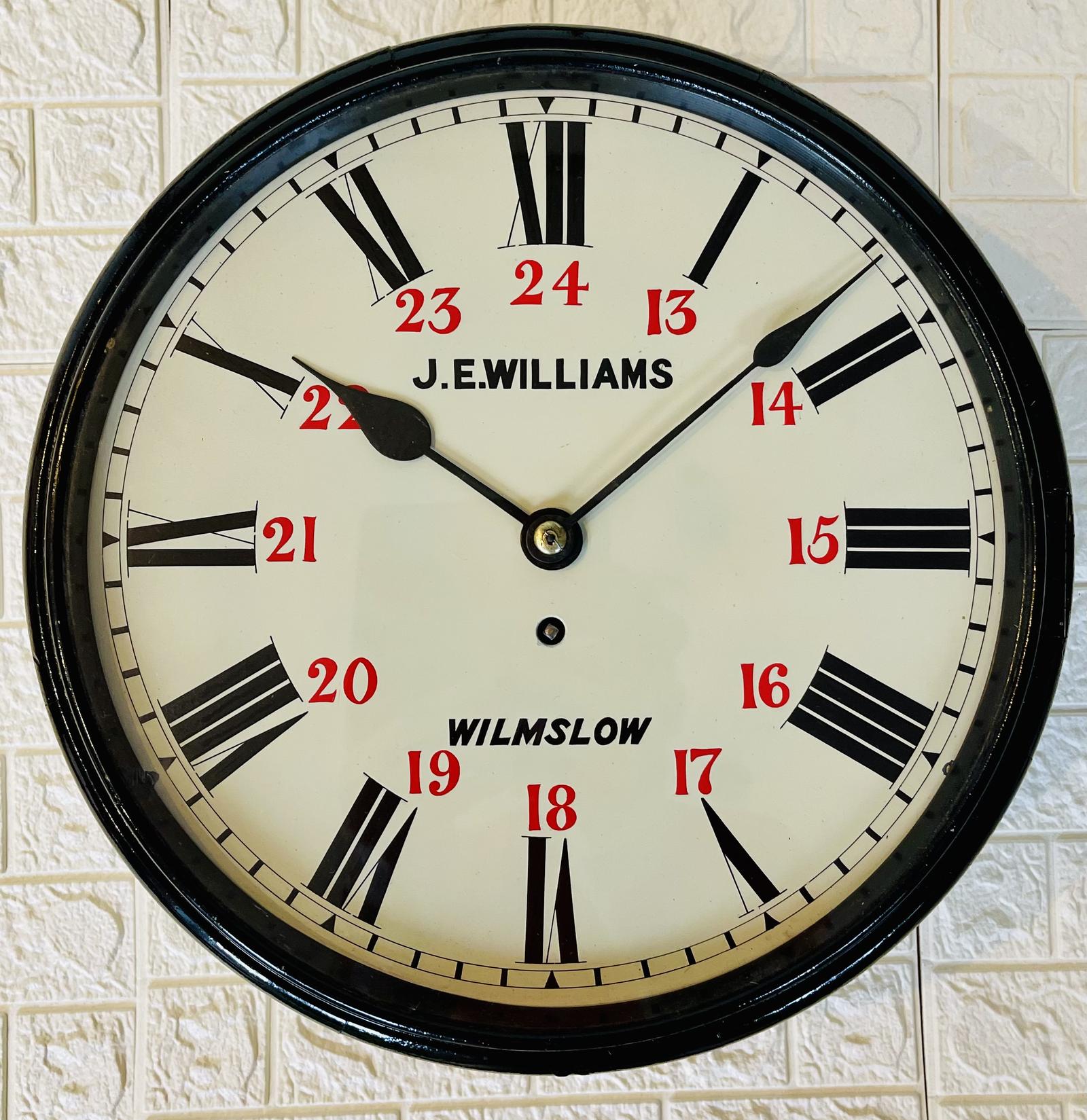Man has been fascinated with telling the time for thousands of years, but it was not until the mid-17th Century that Dutch scientist Christopher Huygens successfully applied a pendulum to clocks allowing for accurate and easy timekeeping. This was followed by other improvements including springs and repeaters. Over time clocks have evolved both technically and aesthetically and remain one of the most cherished items in any home.
While modern digital clocks might have the edge over traditional timepieces when it comes to accuracy and ease, most people know that there remains something timeless and beautiful about the look and sound of antique clocks as they tick,tick,tick their way through our days. 8 day clocks remain as popular as ever for their practicality and overall antique clocks offer a sheer variety of design unavailable new.
At LoveAntiques you will find a fine and large selection of antique and vintage clocks from imposing longcase clocks to smaller carriage and bracket clocks. Our dealers are able to offer beautiful and unusual mantel clocks as well as highly practical Fusee clocks all with the knowledge that they have been checked by our reputable dealers.
£ 950
£ 1,350
Knight Fine Antiques & Collectables
Antique Georgian Oak 8 Day Grandfather Clock by Richard Houton | 18th Century
£ 900
Antique Georgian Oak 8 Day Grandfather Clock by Richard Houton | 18th Century
£ 900
Knight Fine Antiques & Collectables
Masons Antiques
Golden Oak, Four Glass Sided Mantel/Bracket Clock
£ 795
Masons Antiques
Arts & Crafts, Westminster-Chime Wall Clock
£ 425
Kembery Antique Clocks Ltd
Spikins Wandsworth Dial Wall Clock
£ 760
£ 3,150
Georgian Antiques
Large French Gilt Rouge Marble Mantel Clock
£ 3,500
Unique Antiques By Emma Jade
Quality Antique George III Oak & Mahogany Banded Longcase Clock
£ 3,150
Quality Antique George III Oak & Mahogany Banded Longcase Clock
£ 3,150
Unique Antiques By Emma Jade
London City Antiques
Antique Edwardian Mahogany Striking Mantel Clock
£ 885
London City Antiques
Antique Quality Carved Walnut Vienna Regulator Striking Wall Clock
£ 1,285
Antique Quality Carved Walnut Vienna Regulator Striking Wall Clock
£ 1,285
London City Antiques
Kembery Antique Clocks Ltd
A Smiths Ships Clock
£ 225
Kembery Antique Clocks Ltd
A Smiths Enamel Dial Ships Clock
£ 330
£ 575
Kienzle Art Deco Westminster Carillon Oak Wall Clock French/germany Circa 1940
£ 575
Koos Limburg Jnr
Kembery Antique Clocks Ltd
A French Brass Mantel Clock
£ 685
£ 1,250
Kembery Antique Clocks Ltd
A Four Glass Mantel Clock With Enamel
£ 925
Masons Antiques
RAF Officers Mess Clock
£ 1,450
Kembery Antique Clocks Ltd
1991 Omega Seamaster Polaris Chronograph with Box
£ 1,750
Athey Antiques
Black Forest Cuckoo Clock
£ 975
Vintage by the Sea Ltd
Quality Oval Brass Carriage Clock - Garrard & Co Ltd London
£ 180
Vintage by the Sea Ltd
Edwardian Period French Gilded Carriage Clock c.1910
£ 225
Antiques and Things
Art Nouveau Mantle Clock
£ 165
Rees Antiques
Antique Mahogany "Westhaven Grandfather Clock
£ 375
Kembery Antique Clocks Ltd
John Hobbs, Wareham Dial Wall Clock
£ 740
Town House Traders Ltd
Antique Oak Granddaughter Clock
£ 145
Vintage by the Sea Ltd
RARE FRENCH BRUNFAUT DOMED GILT CLOCK 1880
£ 850
Town House Traders Ltd
Art Deco Oak Wall Clock Manner Heals
£ 165
London City Antiques
Antique Victorian Quality Carved Oak Vienna Wall Clock
£ 1,295
Rees Antiques
Antique Dublin Longcase Clock
£ 400
The Sitting Room & Heydays Antiques
Georgian Oak & Mahogany 8 Day Grandfather Longcase Clock
£ 1,385
Georgian Oak & Mahogany 8 Day Grandfather Longcase Clock
£ 1,385
The Sitting Room & Heydays Antiques
The Sitting Room & Heydays Antiques
Stunning Georgian Flame Mahogany Longcase Clock
£ 2,650
£ 3,500
Exceptional Original Portico Clock Garniture, French, Louis Philippe, 1850/70
£ 3,500
Koos Limburg Jnr
£ 1,950
£ 1,800
Masons Antiques
Huge 18" (45cm) Fusee, Wall Clock
£ 695
Athey Antiques
Walnut Bracket Clock - Connell of London
£ 895
Worboys Antiques
Oak Triple Chime Longcase Clock
£ 2,450
Kembery Antique Clocks Ltd
A Small Lantern Clock
£ 350
Sovereign Antiques
CUCKOO CLOCK MUSICAL TRIPLE WEIGHT
£ 395
Antique & Vintage Clock FAQs
How much are vintage and antique clocks worth?
Both Antique and Vintage clocks are highly sought after by collectors around the world and the best can sell for many tens of thousands of pounds (or dollars). Like any item everything comes down to the maker, quality of the movement and design, as well as the overall look of the case. Throughout history people have created beautiful and expensive high end time-pieces, as well as far lower quality items so prices vary widely. Because clocks have many moving parts condition and originality is also very important and a fully restored vintage clocks will naturally be worth far more than one that is not working or needs an overhaul. Although digital clocks have technically been around for over 100 years, those with an electric motor did not come in to widespread use until the second half of the 20th Century. While some digital clocks are becoming more and more collectable, the most valuable remain mechanical clocks because people still admire and appreciate the craftsmanship and time that went into making them. Because there are many places to buy and sell old clocks it is always worthwhile researching your clock to give a sense of current values. However please note that current fashions will cause the value for different types of clocks to rise or fall compared to the past.
How do I know if my clock is an antique clock?
Although the outer design of many clocks has not changed substantially for hundreds of years, the mechanisms quite often have. Obviously if it has a digital dial and movement it will date to the 1960s onwards, and if it is powered by batteries or electric cable will be from the early 20th Century onwards. When it comes to looking at mechanical clocks then it is good to look inside to see if you can find a makers name anywhere. Better quality clocks have been well marked for hundreds of years and usually there will be a history of that maker on the internet. Serial numbers can help with even finer dating if present, but note that is was quite common for clockmakers to sell simple movements to others to put in their own cases. Therefore the movement manufacturer and the clock retailer can be two different people. The very first clocks merely had the hour hand and the face in brass but much of the dating for most clocks comes from understanding subtle changes in design. Therefore for accurate dating it is always worth showing your clock to a specialist who will be able to tell you its history.
How do I sell antique clocks?
There are more places than ever to sell antique clocks from physical shops to online sites such as LoveAntiques as well as auctions. This can be great news for you but it is important to arm yourself with some basic knowledge to ensure your clock sells for the correct amount of money. Clock collectors on the whole are detail oriented people which means that they will be looking closely at its pedigree, originality, rarity, aesthetic appeal and of course if it is working or not. Each of these points can make a big difference to the sale price and just because an item may look fancy or indeed plain, is not telling of its true value. The maker and the movement is the primary factor that aids price, but a simple movement which has been put into a very pretty case by a famous retailer will also command good money. Early clocks will tend to be more valuable than later ones because they were so scarce and valuable at the time, but if possible selling to or at least asking the advice of a specialist will help. If you place the item in auction then ensure that the item is described clearly with plenty of photos and is listed online so that international collectors who understand the field far better than you will be able to spot it.
Does age make an antique clock more valuable?
In theory the older the clock, the higher the value, but identifying authentic antique clocks can be challenging, as looks can be deceiving. There are clocks that look antique - with the right style, material, and colour - but are actually not that old. Also, not all antique and vintage clocks are valuable, as the brand of an antique also plays a big part in its value. Along with evidence of the clock being handmade such as irregularity in the shape, you have to find out the brand. Back then, antique and vintage clocks were considered as works of art, and some brands were known to use a particular style, material and even colour. Thus, aside from the trademark and initials you may find on the dial or the back of the clock, it’s also best to be familiar with the style of a particular brand or even country of origin.


